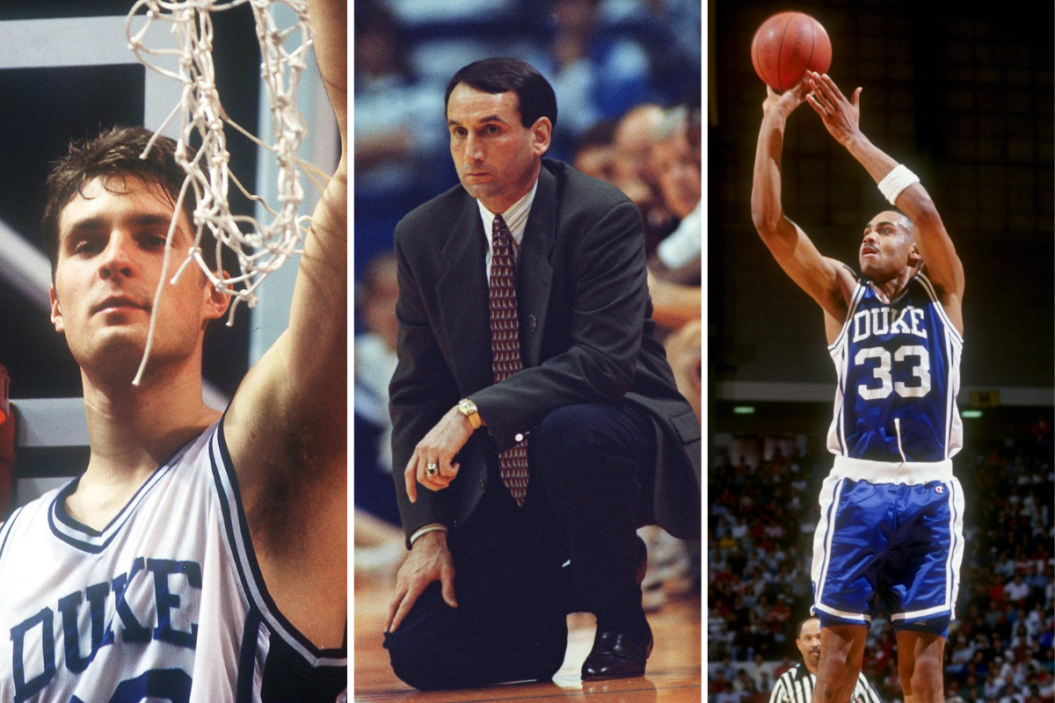Few programs in the history of college basketball can compete with Duke's University's resume? of success. The Durham, North Carolina, school has won five national championships, placing it in elite company. Cameron Indoor Stadium — its pint-sized, historical home for basketball — is one of the toughest places to play in college basketball, with "Cameron Crazies" lining up for days to get tickets. But to see Duke's all time starting five play together for one night? The crazies would line up for months.
Videos by FanBuzz
Renowned head coach Mike Krzyzewski spent 42 seasons at Duke. He took over a struggling team in 1980 and immediately began building the program back up. It took the nation by storm by making the Final Four five times in seven seasons between 1986 and 1992, including back-to-back titles in '91 and '92.
Duke currently sits fourth all-time in NCAA wins. Thirty-six different Blue Devils have been named to the All-American team. Under Coach K, 23 Duke players were chosen in the first round of the NBA Draft — basically, one every other year. The accolades are endless, and the program is stacked.
An all-time all-Duke team would hold its own against any college all-star team from any era. How do you even limit an all-time Duke team to a starting five? With rigor, statistics and a lot of coin flips.
Point Guard: Bobby Hurley
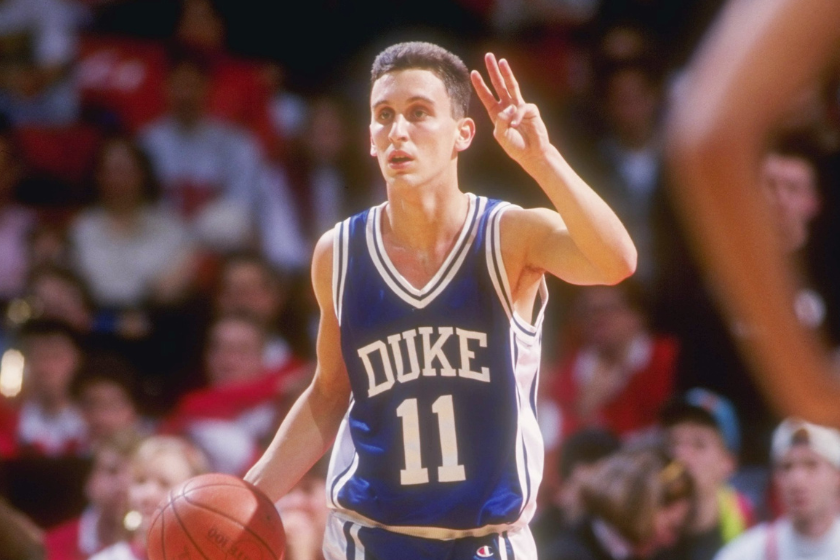
Photo by Doug Pensinger /Allsport
A hallmark of any good college basketball team is a heady point guard. At the college level, when the game slows down and each possession can carry so much weight, having an unflappable ball handler who can dish out assists, score for himself and not turn the ball over is a huge asset.
So it should come as no surprise that Duke has a tradition of very good point guards. Going back to the middle of last century, Dick Groat had a storied career in Durham. The two-time All-American was the National Player of the Year in 1952. At just 5-foot-11, Groat did not dominate with his physicality but instead with his quickness and scoring ability. In his junior season, Groat scored 831 points — a Duke record that would stand for half a century. His No. 10 jersey was retired by Duke only a few months after his college career ended.
Groat was the third overall pick by the Fort Wayne Pistons in the 1952 NBA Draft. However, his NBA career only lasted a season. Why? Well, he was busy becoming an eight-time All-Star Major League Baseball shortstop. The two-time World Series champion was even named NL MVP in 1960. Dick Groat? Dick GOAT.
Duke fans can be a pretty annoying bunch. Here's proposing the Cameron Crazies use their power for good and launch a campaign to get Groat elected to the Baseball Hall of Fame.
OK, enough GROAT TALK.
More-recent Duke point guard standouts include Jason Williams and Chris Duhon. Ironically, while both are point guards, Williams moved over to the 2 spot as they both shared backcourt duties on Duke's 2001 title team. Of course, having two point guards is a great idea when one of them has the scoring and play-making ability of Williams.
Johnny Dawkins, the 1986 Naismith College Player of the Year, would also like a word when it comes to best-ever Duke point guards.
But this spot belongs to Bobby Hurley. The NCAA all-time leader in assists averaged 7.7 dimes per game in his four seasons from 1989-1993. Hurley was a First-Team All-American in his senior year in Durham.
But the real reason Hurley is the starting point guard on Duke's all-time team is his legacy of winning. Hurley's teams made the Final Four three times. In 1991 and 1992, they were back-to-back national champions, the first two in program history. On a team with Christian Laettner and Grant Hill — two guys who may definitely end up in this lineup — Hurley was named Final Four Most Outstanding Player in 1992.
A Duke team with the 6-foot, 165-pound Hurley in command was a team that was probably going to win.
Shooting Guard: J.J. Reddick
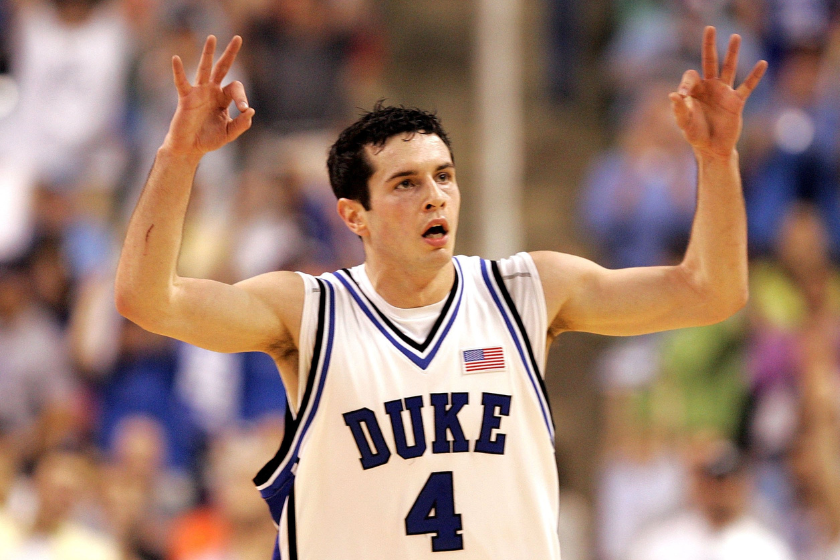
Photo by Streeter Lecka/Getty Images
For the shooting guard on our all-time Duke starting five, let's turn to one of the most hated — and decorated — players in college basketball history: J.J. Reddick.
Reddick is one of the best shooters to ever lace them up in Durham. Highlights of the 6-foot-4 guard are littered with long balls thrown up from all over the court. He was seemingly in perpetual motion, coming off screens, running in circles, doing anything to get open.
And when he got open? The ball usually went in. Reddick was the 2006 National College Player of the Year, a two-time consensus First-Team All-American, and a two-time ACC Player of the Year. Much to the chagrin of Duke fans, the only accolade missing on Reddick's resume? is a national championship.
The "Alaskan Assassin" Trajan Langdon held the Duke record for most 3-pointers until Reddick came along and earns an honorable mention here. Technically, Grayson Allen should probably be mentioned here as well, but it's hard to give any love to one of the dirtiest players in college hoops and the NBA.
Small Forward: Grant Hill
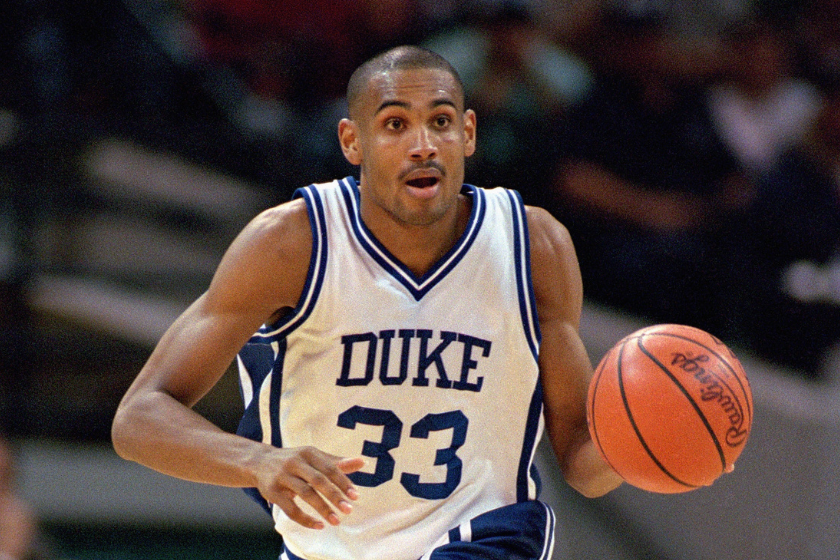
Photo by Doug Pensinger/Getty Images
Grant Hill gets the starting small forward spot on the Duke all-time team. Hill had a very successful career in the NBA, but his athleticism was sapped due to a bevy of injuries. His athleticism had no such constraints in college. The 6-foot-8 forward soared to catch lobs, throw down slams and block shots with authority and grace.
The 1994 ACC Player of the Year was a key contributor on both the 1991 and 1992 back-to-back championship teams. His No. 33 was retired by the Blue Devils, and his legacy as the best small forward in Duke history is pretty secure. What made Hill so special was his aptitude and versatility as a defender. He had height and strength to hold his own against big men, but also quickness and speed to defend perimeter players.
Hill averaged a respectable 3.6 assists per game throughout his college career. But the most important and memorable play in his time at Duke was his three-quarter-court pass to Laettner in the waning seconds of their 1992 Elite Eight game against Kentucky. Laettner converted the jumper, and Duke went on to win another title.
Coming off the bench at small forward for the Duke all-time team is Shane Battier. Battier was one of the winningest players in Duke history, notching 131 victories in his time in Durham, an unofficial record at the time. In 2001, Battier was the National Player of the Year as the Blue Devils won the national championship. He was a defensive specialist, a very cerebral player, and one of the most respected players in both college and the NBA.
Mike Dunleavy Jr. and Kyle Singler should probably be in the conversation. So there, now they're in the conversation.
Power Forward: Gene Banks
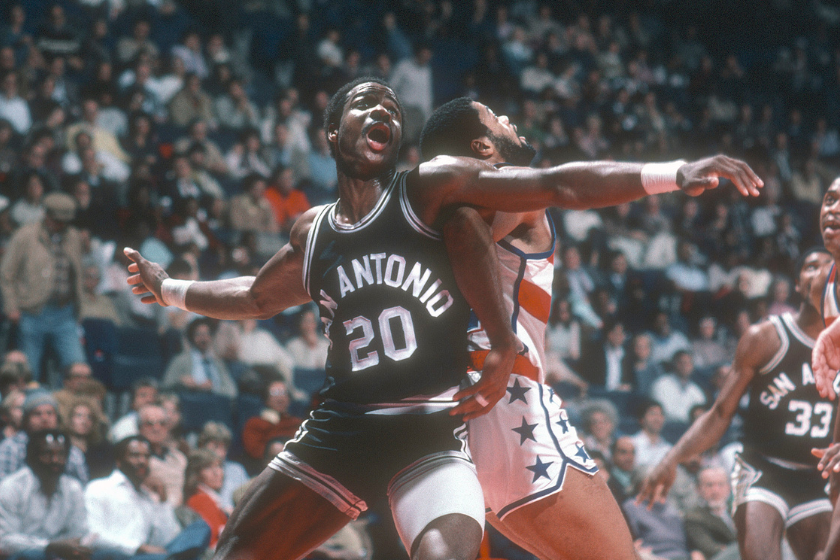
Photo by Focus on Sport/Getty Images
Power forward is less clear-cut than some of the other positions on this imaginary team. Elton Brand was incredibly dominant in his time in college but only spent two seasons with the Blue Devils before leaving for the NBA. Shelden Williams graduated as the Duke all-time leader in blocks and rebounds. He also has the neat designation of recording a triple-double with points, rebounds and blocks. In addition, "The Landlord" is a very funny nickname for a basketball player.
But let's go a little further back in time and make Gene Banks our starting power forward. Banks played at Duke from 1977-1981. He bridged the gap from the pre-Coach K years to the Coach K era. As a freshman, his Blue Devils qualified for the NCAA Tournament for the first time in over a decade and made a run all the way to the national championship game. In a way, that 1977-1978 Duke squad laid the groundwork for the decades of success to follow.
Plus, the 1981 ACC scoring leader could get you a bucket.
Center: Christian Laettner
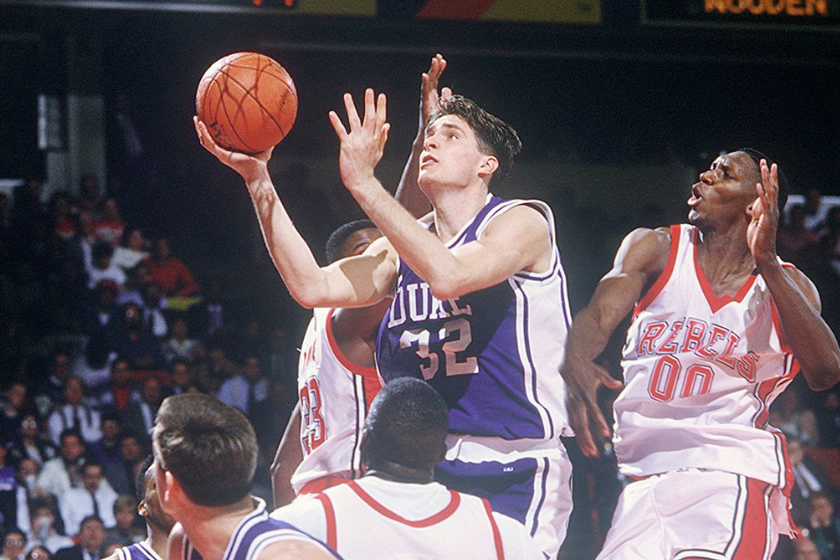
Photo by Rich Clarkson/NCAA Photos via Getty Images Photo via Getty Images
Danny Ferry made three Final Fours in his four seasons as a Blue Devil. He was a consensus First-Team All-American, a Naismith College Player of the Year, and his No. 35 was retired by Duke. Mike Gminski was the anchor of the 1978 Final Four team. When he graduated, he was the Duke career leader in points, rebounds and blocked shots. So how are neither of those guys the starting center on the Duke all-time starting five?
Enter Laettner. All he did was win: four seasons at Duke, four Final Fours. In his junior and senior season, Laettner led the Blue Devils to back-to-back championships. And on the biggest stage, Laettner played his best. Everyone remembers "The Shot" to beat Kentucky in the 1992 Elite Eight. But not everyone remembers that Laettner went 10-for-10 from the free throw line and 10-for-10 from the field in that game, finishing with 31 points on 100% shooting.
Laettner was a consensus First-Team All-American, the National College Player of the Year, and the USA Basketball Male Athlete of the Year. We may remember him as the odd duck on the '92 Dream Team, but Laettner had a legendary, unmatched career at Duke. For his clutch moments alone, he has to be the big man on the all-time team.
